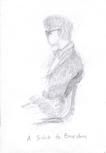Thursday, September 23, 2004
The Separation of Church and France
Iraqi militants are still holding two French journalists hostage and demanding that France revoke a new law banning "conspicuous religious symbols," like Muslim headscarves, from public schools. The terrorists say they will behead the journalists unless the French government changes the law.
Few blame the French government for refusing to negotiate with terrorists. Schools will enforce the law when they open on Thursday. Still, many wonder why France banned such seemingly innocuous religious symbols from public schools to begin with. The answer, in a French word, is "laïcité."
***
Today's Knowledge
The Separation of Church and France
Jesus said, "Render unto Caesar the things that are Caesar's, and unto God the things that are God's." Still, the actual separation of church and state is a more recent affair--especially in France, where arguments over "laïcité" still cut to the nation's cultural heart.
Lay a What?
Laïcité is a hard-to-translate French word that shares roots with "laity" (as opposed to clergy). It translates most directly as "secularism," though it carries a lot more cultural weight. Where Americans argue over "church and state," the French debate "laïcité."
Scholars trace the ideas behind laïcité back to the French Revolution, but the term itself didn't appear until the late 19th century. During France's Third Republic (1870-1940), the government worked hard to transform a Catholic state into a secular one--especially in building a secular education system. The concept of laïcité, which entailed a strict removal of the church from civic affairs, developed as a key part of the effort to make "peasants into Frenchmen."
Back then, republican liberalism in France was a fighting creed rather than an accepted political ideology. Even today, "laïcité!" remains a rallying cry in France in a way that "secularism!" never has been in the English-speaking world. Many see it as a hard-won, crucial-to-protect element of French political and cultural life. They say that given a history rife with religious bloodshed, laïcité makes space for civic life.
Don't You Mean Religious Freedom?
In the United States, the First Amendment guarantees citizens' freedom of conscience: "Congress shall make no law respecting an establishment of religion, or prohibiting the free exercise thereof." France's 1905 Law of Separation covers basically the same ground, preventing the state from "subsidizing" any religion or restricting "religious freedom."
But laïcité involves more. Where Americans see the First Amendment mainly as a protection against the state, which has no right to meddle in religious affairs, the French locate in laïcité an additional protection for the state, where citizens cannot impose religious beliefs on others. In the words of French historian Claude Nicolet, "a republican can think what he wishes, provided he thinks by himself." The French tend to view public displays of religious belief as, at best, uncouth.
Common Spaces
So laïcité isn't simply about the state staying out of the way of the church. It's about the church staying out of the way of the state--and the state preserving and promoting public spaces where people set aside religious and other "private" differences for the sake of shared republican citizenship. In these spaces (like schools), the state unapologetically promotes the virtues of republican liberalism.
In a sense, the notion of laïcité establishes rules for entry into public spaces in France akin to the rules for entry into sacred spaces elsewhere. French Finance Minister Nicolas Sarkozy put it this way: "When I enter a mosque, I remove my shoes. When a Muslim girl enters school, she must remove her veil."
Steve Sampson
September 1, 2004
Want to learn more?
Read our thumbnail history of the French Republic
KnowledgeNews.net * 123 South 6th Street * Marshall, Illinois 62441 * USA
